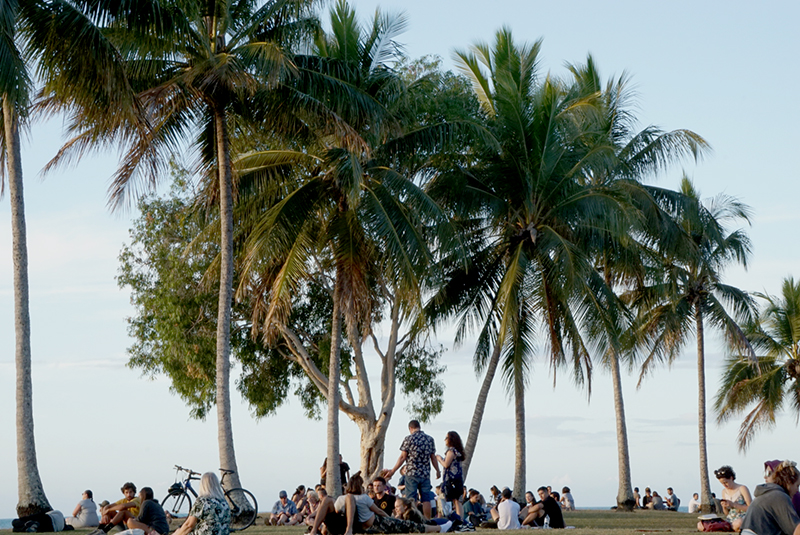How Port Douglas became a haven for Latino travellers - Part 3
SPECIAL GUEST FEATURE

My name is Javiera Navarro, a traveller from Chile, and I am here to give you insight into your temporary neighbours.
In this three part series I will explain who we are, why we come here, and what draws us to Port Douglas year after year.
Read Part 1 of the Latino Traveller Series Here
Read Part 2 of the Latino Traveller Series Here
Part 3: How we live among the locals
We have learned that lots of the backpackers that are in Port Douglas working are here to do the three months of hospitality job to extend for the second year Work and Holiday Visa.
Also, many of these young travellers are Latinos, mainly from Argentina and Chile.
So what happens when they arrive at this paradisiac little place full of palm trees and an amazing four-mile beach? Is it that easy to find a job? Where do they sleep? Well, let’s find out.
Leo is a backpacker from Argentina. He decided to do the three months specific work in Port Douglas.
“Before Port, I was in Sydney, where finding accommodation and a job is very easy, so when I arrived here everything was different,” Leo said.
For us living and working in Port Douglas, there are only a few options for accommodation: a backpacker hostel, to rent a room in a local’s home, or to get a lease.
The first one can be very comfortable for the first days while finding another place more permanent. But after a few weeks, starts to be inconvenient.
First of all, not everybody wants to come home after a long day of physical work to an eight-bed shared room.
Second, is not much cheaper than the other options (around $190 a week for a shared room in all the hostels).
"To rent a room to a local person can be a very good option. The prices vary a lot (from $120 to $400 a week), but you can have your own room, in some cases your own bathroom, and sharing with a local family could be a great experience of cultural exchange.
The “dreamy” situation is to get a lease of a house or apartment, but it is hard.
The backpacker has to stay at least six months, have a lot of money to assure the real estate company, and to pay a bond. But in the end, it's the best option to save money weekly.
Passing the accommodation problem, now we have to find a job.
Paloma is a backpacker from Chile. This season is her first time in Port Douglas and she is working as a housekeeper to extend for the second year visa.
She looked for a job for more than a month before finding one. Same as Alejandro, also from Chile, who during a couple of weeks without finding a steady job, had to “juggle” many little jobs like cleaning cars, houses, doing gardening, farm work, etc.
The Argentinian Belén had better luck finding a job very quickly.
“I know many people who struggled a lot to find a job or who had to leave Port without any luck. Fortunately, that wasn't my case and I found a job very quickly”, Belén said.
Alejandro has a theory: “You have to be in the right place at the right time”.
For these four backpackers, Port Douglas has been nothing but good experiences. The best thing for Paloma about Port Douglas is the weather and that she can ride her bike everywhere.
For Belén it is the calm of the place: “This is my second time in Port Douglas. It is a great town to live in and lower the revolutions after living in a city. There is a lot of great energy, and the people are very nice and cool”.
If Leo could say something to the locals it would be "because we are backpackers doesn't mean we are ‘slackers around the world,'" he said.
"Most of us have a college degree and left our jobs (a good one, in my case) to come to Australia and change the routine, travel, have new experiences, and then go back home and continue our lives.”
“It is not easy to live in another country, with a different language and working in jobs that we don’t normally do, but we do it for our own choice, to live other experiences and grow in other aspects of life”, reflects Belén.
Join the conversation
Give a THUMB UP or THUMB DOWN on what we've covered OR place a COMMENT below.
Got a great news tip or video? We'd love to see it.
Send news tips to editor@newsport.com.au
* Readers are encouraged to use their full details below to ensure comment legitimacy. Comments are the opinions of readers and do not represent the views of Newsport or its staff. Comments containing unlawful, obscene, defamatory, personal or abusive material will not be published.

